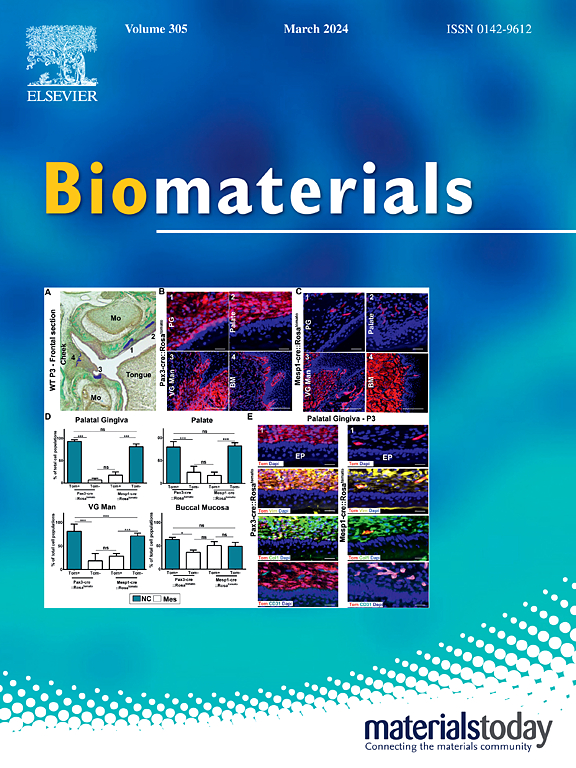基于抗坏血酸/蛋氨酸的CH4递送纳米药物用于肿瘤靶向治疗。
IF 12.8
1区 医学
Q1 ENGINEERING, BIOMEDICAL
引用次数: 0
摘要
甲烷(CH4)被认为是一种新兴的抗炎和抗癌分子,具有很高的生物安全性,但CH4的靶向递送是一个棘手的难题。在此,我们提出了一种基于肿瘤内 H2O2 触发的抗坏血酸(AA)/蛋氨酸(Met)级联反应的 CH4 递送策略,并构建了一种用于肿瘤靶向 CH4 治疗的新型纳米药物(AMN)。令人鼓舞的是,AMN实现了CH4的有效肿瘤靶向递送和瘤内H2O2响应性释放,具有显著的抗癌效果和较高的生物安全性。从机理上讲,我们发现瘤内释放的 CH4 不仅能通过抑制 4T1 肿瘤细胞的线粒体代谢诱导其凋亡,还能通过重编程肿瘤相关巨噬细胞(TAMs)表型(M2 到 M1)激活肿瘤免疫治疗。通过肿瘤靶向递送 CH4,将上述抗癌途径结合起来,为 AMN 的卓越抗癌功效做出了贡献。所提出的 CH4 递送策略为安全有效的肿瘤治疗打开了一扇新窗口。本文章由计算机程序翻译,如有差异,请以英文原文为准。
Ascorbate/methionine-based CH4 delivery nanomedicine for tumor-targeted therapy
Methane (CH4) is identified to be an emerging anti-inflammation and anti-cancer molecule with high bio-safety, but the targeted delivery of CH4 is a thorny challenge. Herein, we propose a CH4 delivery strategy based on an intratumoral H2O2-triggered cascade reaction of ascorbic acid (AA)/methionine (Met), and have constructed a new nanomedicine (AMN) for tumor-targeted CH4 therapy. Encouragingly, AMN realizes the effective tumor-targeted delivery and intratumoral H2O2-responsive release of CH4, and exhibits significant anti-cancer effects and high bio-safety. Mechanistically, we have discovered that intratumoral released CH4 can not only induce the apoptosis of 4T1 tumor cells by inhibiting their mitochondrial metabolism, but also activate tumor immunotherapy by reprogramming tumor-associated macrophages (TAMs) phenotype (M2 to M1). The combination of the above anti-cancer pathways by virtue of tumor-targeted CH4 delivery makes contribution to outstanding anti-cancer efficacy of AMN. The proposed CH4 delivery strategy opens a new window for safe and effective tumor therapy.
求助全文
通过发布文献求助,成功后即可免费获取论文全文。
去求助
来源期刊

Biomaterials
工程技术-材料科学:生物材料
CiteScore
26.00
自引率
2.90%
发文量
565
审稿时长
46 days
期刊介绍:
Biomaterials is an international journal covering the science and clinical application of biomaterials. A biomaterial is now defined as a substance that has been engineered to take a form which, alone or as part of a complex system, is used to direct, by control of interactions with components of living systems, the course of any therapeutic or diagnostic procedure. It is the aim of the journal to provide a peer-reviewed forum for the publication of original papers and authoritative review and opinion papers dealing with the most important issues facing the use of biomaterials in clinical practice. The scope of the journal covers the wide range of physical, biological and chemical sciences that underpin the design of biomaterials and the clinical disciplines in which they are used. These sciences include polymer synthesis and characterization, drug and gene vector design, the biology of the host response, immunology and toxicology and self assembly at the nanoscale. Clinical applications include the therapies of medical technology and regenerative medicine in all clinical disciplines, and diagnostic systems that reply on innovative contrast and sensing agents. The journal is relevant to areas such as cancer diagnosis and therapy, implantable devices, drug delivery systems, gene vectors, bionanotechnology and tissue engineering.
 求助内容:
求助内容: 应助结果提醒方式:
应助结果提醒方式:


